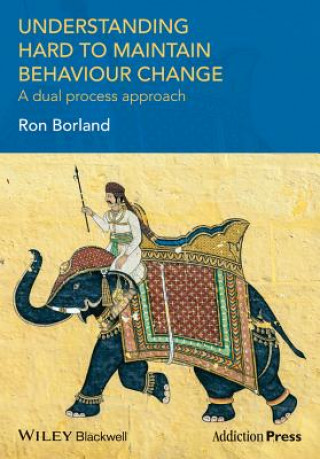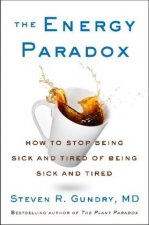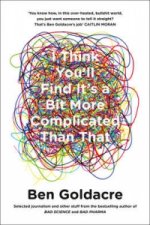
Code: 04951679
Understanding Hard to Maintain Behaviour Change - A Dual Process Approach
by Ron Borland
The book presents an integrative theory of hard-to-maintain behaviours, which includes hard-to-reduce or eliminate behaviours such as smoking and other drug use, overconsumption of food or unsafe sex, and hard to- sustain behaviou ... more
- Language:
 English
English - Binding: Paperback
- Number of pages: 252
Publisher: John Wiley & Sons Inc, 2014
- More about this

69.65 €

Low in stock at our supplier
Shipping in 10 - 15 days
Potřebujete více kusů?Máte-li zájem o více kusů, prověřte, prosím, nejprve dostupnost titulu na naši zákaznické podpoře.
Add to wishlist
You might also like
-

Skip*Beat!, Vol. 12
8.48 € -25 % -

Vascular Disease
128.97 € -

Racial Politics in Contemporary Brazil
112.91 € -9 % -

RNA Biology - An Introduction
76.40 € -9 % -

Stopping the Brain Drain of Skilled Veteran Teachers
96.44 € -

Skills For Life
25.87 €
Give this book as a present today
- Order book and choose Gift Order.
- We will send you book gift voucher at once. You can give it out to anyone.
- Book will be send to donee, nothing more to care about.
More about Understanding Hard to Maintain Behaviour Change - A Dual Process Approach
You get 172 loyalty points
 Book synopsis
Book synopsis
The book presents an integrative theory of hard-to-maintain behaviours, which includes hard-to-reduce or eliminate behaviours such as smoking and other drug use, overconsumption of food or unsafe sex, and hard to- sustain behaviours such as exercise and sun-safe behaviours. Most of the examples come from the author's work on tobacco smoking, but it is relevant to anyone who is concerned to understand why some forms of desirable behaviour are so hard to achieve, and to those trying to help people change. It also has important implications for public health campaigns and for the development of policies to nudge behaviour in desirable ways. Current ways of thinking about health behaviour change are seriously limited. Simple rationality-based models are insufficient. Advances in neuroscience are establishing the importance of affective (emotional) responses as determinants of behaviour. However, while these can sometimes be influenced by rational processes, this influence is only partial and, for many, insufficient to allow unconflicted pursuit of what we believe is in our best interests. The theory the book elaborates, CEOS theory, explains how behaviour is jointly determined by the Context in which the person lives and two interrelated elements of internal function which it calls the Executive and Operational Systems. The key determinants of the latter are the influences of what is called the Operational System, which represents the parts of human functioning that we share with infrahumans. It responds to what is happening in the moment and controls the means by which we act on the world. The Executive System is based on linguistic models that are references to conceptual ideas of what could be; it is the well spring of our capacity to act with foresight. The theory helps us understand why determinants of the initiation of attempts to change behaviour differ from those that influence the long-term success of those attempts. It sees the former as largely driven by executive processes and thus amenable to theorising around rational, expectancy value models, while maintenance of change is more affected by particular kinds of experiences associated with trying to adopt the new pattern of behaviour. This book follows a recent trend in theorising about behaviour change by taking a dual-process approach. Related theories include Nudge, a theory with which it shares several key elements around the importance of more effective communication and targeted environmental changes as strategies for change. The book provides readers with frameworks to: determine whether a "hard-to-maintain" behaviour is a result of the skills needed to perform it, its reinforcement history, the way the person thinks about it, the context, or some combination of these; better integrate cognitive and behavioural change strategies, including emergent strategies related to mindfulness and acceptance, plus novel ways of retraining operational processes; understand the different nature of challenges for behaviours where multiple attempts are typically required before the desired behaviour pattern is sustained; better understand the role of feelings and emotions as influences on behaviour; understand the limits of environmental factors to determine change; and understand the limits of self-control and willpower. Thoughtful practitioners will find the book extremely useful in trying to work out better ways to help their clients and to challenge them to review some of their current orthodoxy.
 Book details
Book details
Book category Books in English Medicine Medicine: general issues Public health & preventive medicine
69.65 €
- Full title: Understanding Hard to Maintain Behaviour Change - A Dual Process Approach
- Author: Ron Borland
- Language:
 English
English - Binding: Paperback
- Number of pages: 252
- EAN: 9781118572931
- ISBN: 1118572939
- ID: 04951679
- Publisher: John Wiley & Sons Inc
- Weight: 396 g
- Dimensions: 244 × 169 × 13 mm
- Date of publishing: 31. January 2014
Trending among others
-

Glucose Revolution
15.74 € -21 % -

The Art & Science of Foodpairing
38.76 € -21 % -

Neurosonology and Neuroimaging of Stroke
172.75 € -14 % -

Spillover
12.26 € -24 % -

Fortify Your Life
21.67 € -20 % -

Why We Eat (Too Much)
11.45 € -21 % -

China Study: Revised and Expanded Edition
16.36 € -12 % -

Encyclopedia of Bach Flower Therapy
28.63 € -20 % -

Miller's Review of Critical Vaccine Studies
18.81 € -19 % -

Nutrition and Physical Degeneration
36.91 € -

Rewire Your Anxious Brain
17.79 € -12 % -

Energy Paradox
23.92 € -16 % -

Gordis Epidemiology
55.33 € -1 % -

Cure Tooth Decay
37.12 € -

Clever Guts Diet
11.45 € -28 % -

Motivational Interviewing in Nutrition and Fitness
38.04 € -

Salt Fix
15.43 € -28 % -

Yes, You Can Get Pregnant
16.46 € -18 % -

After Cancer Care
15.03 € -22 % -

Nutrition and Physical Degeneration
35.69 € -

Gut
8.99 € -28 % -

Oxford Handbook of Clinical Medicine
61.67 € -

It's All in Your Head
11.04 € -23 % -

Close Your Mouth
13.29 € -23 % -

Decision Modelling for Health Economic Evaluation
82.74 € -

Manual of Dietetic Practice 6e & Dietetic Case Studies Set
149.02 € -5 % -

Worry Trick
16.97 € -20 % -

Body Awareness as Healing Therapy
13.90 € -20 % -

Bio-identical Hormones and Telomerase
21.26 € -18 % -

Inner Level
10.63 € -26 % -

I Think You'll Find It's a Bit More Complicated Than That
14.41 € -23 % -

Cancer Revolution
15.03 € -29 % -

Evidence-Based Medicine
42.13 € -6 % -

Causal Inference for Statistics, Social, and Biomedical Sciences
65.55 € -2 % -

Never Too Late to go Vegan
15.23 € -17 % -

Integrative and Functional Medical Nutrition Therapy
150.76 € -4 % -

Nutritional Psychiatry
49.70 € -

Nutrition for Sport and Exercise - A Practical Guide
62.59 € -

Nutrition for Sport, Fitness and Health
134.19 € -10 % -

Nutrition Essentials for Mental Health
50.01 € -1 % -

Mikronährstoff-Räuber: Metformin
5.10 € -

Clinical Studies in Medical Biochemistry
69.65 € -

Marijuana Medicine
26.28 € -4 % -

Galen on Food and Diet
65.45 € -

Marketing Nutrition
139.71 € -

Oxford Handbook of Applied Bayesian Analysis
82.43 € -

WHO classification of tumours of haematopoietic and lymphoid tissues
227.67 € -

Bella Figura
9.40 € -28 % -

Proteinaholic
13.70 € -14 %
Collection points Bratislava a 2642 dalších
Copyright ©2008-24 najlacnejsie-knihy.sk All rights reservedPrivacyCookies


 15549 collection points
15549 collection points Delivery 2.99 €
Delivery 2.99 € 02/210 210 99 (8-15.30h)
02/210 210 99 (8-15.30h)